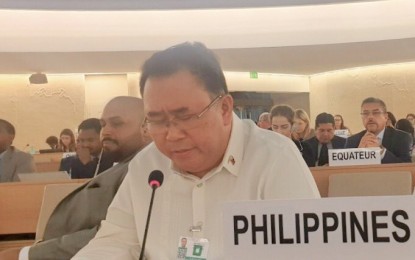
Undersecretary Severo Catura, Executive Director of the Presidential Human Rights Committee Secretariat (PNA File photo)
MANILA – Admitting that the issue of "red-tagging" is a very serious concern that has to be properly explained, a Palace official said it was Communist Party of the Philippines (CPP) founding chairman Jose Maria "Joma" Sison himself who red-tagged militant organizations and individuals.
In a virtual presser on Dec. 11, Undersecretary Severo Catura, Executive Director of the Presidential Human Rights Committee Secretariat (PHRCS), said the government “has never red-tagged anyone.
Catura said various statements associating some organizations and individuals to the communist movement were based on the pronouncements of Sison in a video during a meeting at the International Center, CIC in Brussels, Belgium on March 4, 1987.
“At any rate, even while there are of the armed revolution, there are the legal democratic forces in the Philippines. The biggest of these is Bagong Alyansang Makabayan or BAYAN, in short. Its biggest component organizations are: Kilusang Mayo Uno which is the labor center; the Kilusang Magbubukid (KMP); GABRIELA, the woman’s Alliance; League of Filipino Students (LFS); Alliance of Concerned Teachers (ACT); KADENA; and so on,” Sison was quoted as saying.
Some government critics, Catura said, often correlate the issue of red-tagging to the anti-terrorism campaign.
"It actually takes off from statements coming from Joma Sison himself, who identified groups that are supportive of his organization, an organization that advocates for the violent overthrow of the Philippine government," he added.
He said the red-tagging issue can be inimical in the effective implementation of the Anti-Terrorism Law, he said.
Respect for civic space
"Now, remember that under the Anti-Terrorism Law, we need to clarify also that dissent, legitimate dissent, peaceful dissent, advocacy are excluded from the Anti-Terrorism Law," Catura said. "In fact, the provision in the Anti-Terrorism Law, you’ll be surprised, is very much respectful of what we call the civic space wherein people should be able to avail of if only to have their own advocacies but we should clarify that these advocacies should be using peaceful means."
Catura added that various terms including "advocacy, protest, dissent, stoppage of work, industrial or mass action, and other similar exercises of civil and political rights" are excluded from the definition of "terrorism”, as stated in Section 4 of the Anti-Terror Act of 2020.
"I think, that term [red-tagging] is simply to diminish the value to have a very effective Anti-Terrorism Law and at the same time it wishes to diminish the efforts of the government to address terrorism in our midst," Catura said. "So, it’s all about using the same term to really move forward an agenda that they are being persecuted, when in fact they are not."
He said there would have been visible cases of unjust detention, suppression, and physical harassment if the government was really red-tagging groups, organizations, or individuals.
Meanwhile, former cadres of the New People's Army (NPA) have recently come out to expose the deceptive recruitment schemes of the communist group through its legal front organizations.
The former NPA members, in identifying various militant organizations that served as the recruitment arm of the communist group, explained the mutual relationship of the legal democratic mass movement with the revolutionary underground mass movement. (PNA)
